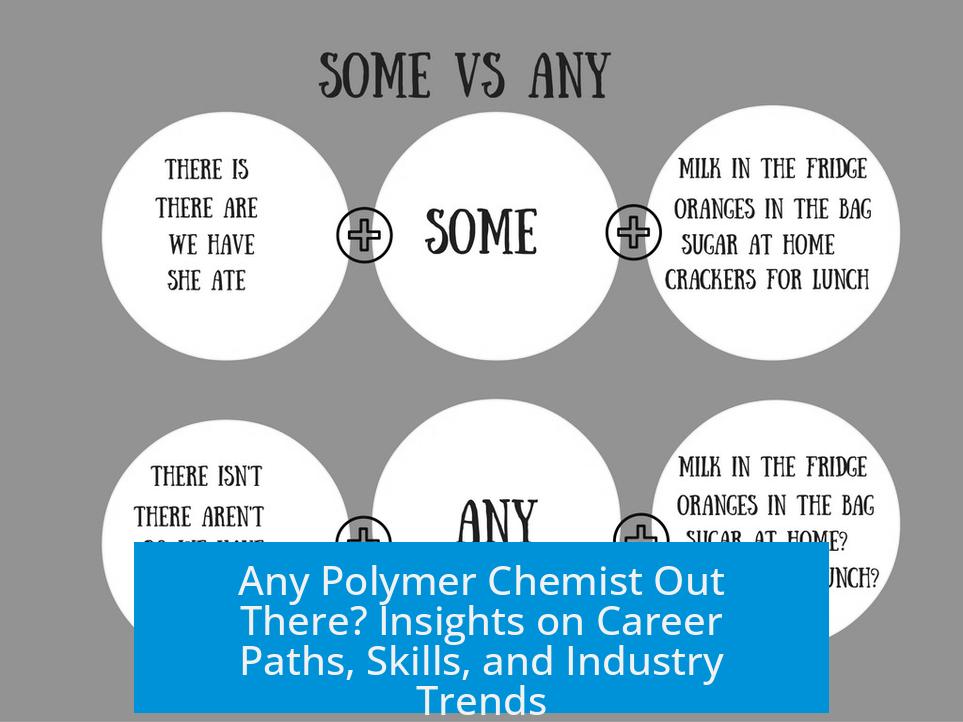Any Polymer Chemist Out There? Understanding the Field and Career Outlook
Polymer chemistry stands out as a robust and promising field within the chemical sciences. It offers diverse industrial applications, interesting research opportunities, and solid career prospects, especially for those pursuing a PhD. The field combines organic synthesis, materials science, and applied industrial chemistry, focusing on the creation and manipulation of polymers to serve evolving market demands.
Professional Background and Industry Perspective
The Author’s Experience
The journey into polymer chemistry commonly begins in academic research focused on monomer synthesis, polymerization techniques, and polymer characterization. For example, the author, armed with a PhD in organic chemistry, has worked for a decade across various sectors including explosives, pharmaceuticals, and construction materials before settling in a global specialty polymers manufacturer.
Polymer chemistry offers notable job security and diversity. It feeds into growing markets like electronics, healthcare, and sustainable materials. While bulk commodity polymers such as polyester for soda bottles or nylon for carpets remain significant, the modern sector largely revolves around high-value, functional polymers.
Career Advice: Education Level Matters
- PhD is typically recommended for polymer chemists aspiring to advanced roles, especially in large companies.
- PhD-level positions are generally more stable compared to synthetic organic chemistry jobs.
- A master’s degree can suffice for decent opportunities, notably in Europe, but options may be more limited.
- Choosing to pursue a PhD should align with personal interests and career goals without pressure.
Cross-Disciplinary Applications and Market Trends
Polymer chemistry often intersects with industrial application sciences. While drug delivery polymers are an exception due to their biomedical focus, most research and development cater to material science and product innovation.
The field contributes heavily to battery technologies and energy storage, an area undergoing rapid expansion. Polymer chemists with expertise in battery materials find their advanced skills highly desirable. Materials science crossover is common; thus polymer chemists can enhance their profiles by taking related courses.
Research and Academic Outlook
Active Research Areas
Current polymer research targets sophisticated control over polymer structures. Industries favor chain polymerization techniques for ease of handling, but next-generation applications, such as data storage and finely tuned functional materials, require control over:
- Dispersity (molecular weight distribution)
- Sequence regulation
- Material properties at the molecular level
These advancements point to a booming research landscape. Techniques to achieve precision polymer architectures are rapidly evolving globally.
Influential Researchers to Know
The field owes much to leading scientists. Notable polymer chemists include:
- Matyjaszewski – pioneer of controlled radical polymerization
- Sawamoto – a key figure in polymer synthesis methods
- D. Leigh and J-F. Lutz – recognized for innovations in polymer functionalization and sequence control
Studying their work offers insight into cutting-edge polymer chemistry principles.
Practical Experience and Job Market Insights
Personal Growth in Polymer Chemistry
Polymer chemistry often becomes a favorite even for newcomers without an undergraduate polymer background. Running polymerizations weekly, professionals discover a wealth of fascinating material.
For those seeking to deepen their knowledge beyond the workplace, educational workshops, online courses, and conferences serve as valuable resources.
Industry Environment and Growth Potential
Polymer chemists working in companies focused on epoxies, polyurethanes, and advanced plastics report positive job satisfaction. A key feature is rapid market evolution driven by regulatory changes, such as BPA and phthalate restrictions, pushing innovation continuously.
This creates abundant opportunities for growth and development in new polymer blends and sustainable material technologies.
Industry Reality and Practical Skills Needed
Though polymer chemistry involves fascinating reactions, industrial roles often treat polymers as finished physical materials, focusing less on chemistry and more on properties.
Two critical practical skills are:
- Understanding how monomer modification influences polymer physical properties.
- Knowing how to measure polymer properties including rheology (flow behavior), strength, and degradation tendencies.
Knowledge of degradation mechanisms from environmental exposure (UV light, oxygen) is also crucial, as these influence product lifespan and performance.
Summary of Key Takeaways
- Strong career prospects exist in polymer chemistry across diverse industries.
- A PhD is advantageous for stability and advancement but not mandatory everywhere.
- Polymer chemistry blends organic synthesis and materials science with practical industrial applications.
- Emerging research focuses on molecular precision, sequence control, and specialized polymer functions.
- Industry values practical skills in property evaluation and understanding degradation in real-world conditions.
- Continuous learning through courses and industry engagement is important to stay current.
What makes polymer chemistry a strong field for job prospects?
Polymers cover high-growth markets like battery technology and specialty materials. The field offers stable positions, especially for PhD holders. Even commodity polymers pay well, with many non-commodity areas expanding.
Is getting a PhD necessary to succeed in polymer chemistry?
PhDs are preferred by large companies and offer stability. However, good master’s-level jobs exist, especially in Europe. Choose based on your interests and career goals.
How does polymer chemistry connect with other scientific fields?
Polymer chemistry often intersects with material science and industrial applications. Courses in materials can complement your polymer studies. Polymers also play roles in fields like drug delivery and battery tech.
What research trends should polymer chemists watch for?
Active research focuses on precise control over polymer properties—dispersity, sequence, and morphology. Advances in chain polymerization techniques aim for better material performance and have wide industrial interest.
What practical skills are vital for working with polymers in industry?
Understanding how monomers affect polymer physical properties is key. Also crucial is knowledge of techniques measuring these properties, such as rheology. The chemical reactions themselves are often less emphasized.
Where can I deepen my polymer chemistry knowledge beyond work?
Look for specialized courses, workshops, or academic groups focusing on polymer synthesis and characterization. Industry seminars and collaborations with universities can also provide valuable insights.





Leave a Comment